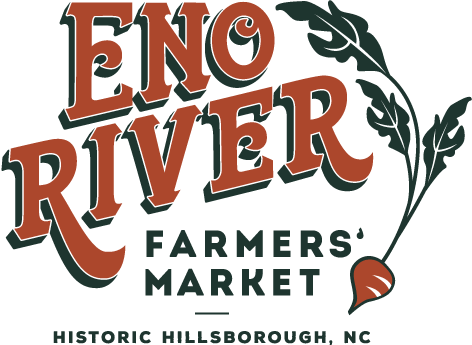In February 2011, Mary Leonhardi and Bradley Dokter bought a 14.5 acre property in Cedar Grove after following their daughter and her family to North Carolina from Michigan. Near the end of 2011, Mary retired, and we launched our joint dream to raise some of our own food from our land. First, we developed a small garden. Clearing all the scrub trees and weeds was hard work (we used no machinery except a weed wrench and hand tools) so we made a decision to get goats to help us clear larger areas. Because Mary wanted to milk, we got milk goats, which have proceeded to clear the land enough so we could enlarge our garden. Chickens followed not long after. We started with two that we gave to our grandson as a gift and our flock gradually got larger from there. As of February 2019 we have 44 chickens and have ordered another two dozen chicks. We had been feeding them organic grains, but a customer at the market asked if we could feed them soy free organic grains. The extra expense was minimal so that became what we feed our chickens. They also free range our property during the day. They do some positive weeding but also have dug up daffodil bulbs and many small plantings. It’s typical when Mary is planting for the chickens to move in immediately and enjoy the bugs and freshly turned soil to find food morsels. It's ironic that, for two flower beds, we use chicken fencing to keep chickens out rather than to keep them in.
Our goat herd has grown substantially, and we are expecting four mother goats will deliver kids within the next month so we will have a continuous supply of milk.
Two years ago, because of a need at the market and also because we needed a reason to attend the market in the winter, we decided to make a stab at selling coffee. We appreciate everyone who has supported us by getting their caffeine (or tea/cocoa) fix on Saturday mornings with us! We missed only one market day in 2018, the before Thanksgiving, mid-week, market day, so you can count on us being there.
A year and a half ago, Mary made a decision to follow another passion: to sell potted plants at the market. She started small, with seedlings, cuttings, and divisions of plants. She has taken propagation classes and further developed the variety of plants offered. There have been requests for more shade plants so that is a focus for her now. All plants are grown in a soil mixture she makes with compost, biochar, worm castings, pine fines and coir (ground coconut hulls). No commercial fertilizers or other chemicals are used. Her nursery is outside underneath a willow oak tree (fenced to prevent chicken predation) and is only covered when the temperatures go below about 20 degrees. The plants live there in pots (which is harder on them than being in the ground) so they are likely, given adequate watering and good site placement, to survive in your yard. The plants are often smaller and sometimes less showy than those nurseries sell, but most plants survive better if planted when small to ensure that they establish good root systems in your soil. Mary is happy to share her plant knowledge and welcomes questions.
Bradley, partially retired as of March 2019, has many plans to upgrade infrastructure and possibly expand our market offerings. He’s considering ducks – he says SOMETHING on the farm should be happy, in protracted periods of rain.
Market preparation every Friday night and spending much of Saturday at the market sometimes feels a bit grueling, but the friendships, conversations and meeting the great customers makes it worthwhile.

